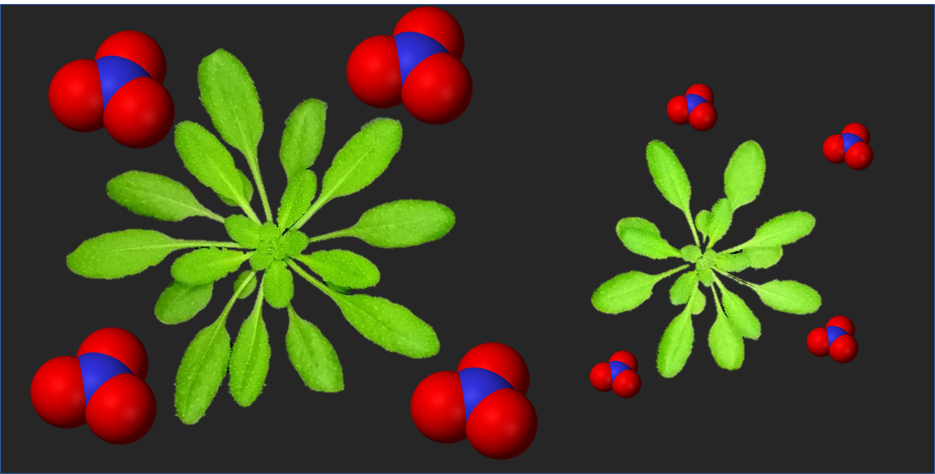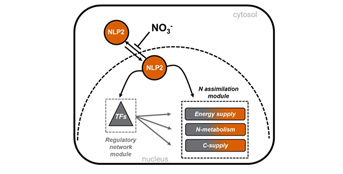Discovery of the key role of a protein in plant metabolism
Nitrogen is an essential element for plant growth and therefore for agricultural production. Understanding how plants assimilate nitrogen is essential for developing sustainable agriculture using less fertilizer. The "Nitrogen Use, Transport and Signaling" NUTS team in colaboration with the ENS of Lyon, the University of Poitiers, the Max Planck Institute and the University of Paris-Saclay have discovered the major role of a protein in the nitrogen assimilation metabolism. Called NLP2, it regulates both nitrogen assimilation and carbon metabolism, which ensures the plant's energy supply. Their results, published in The Plant Cell, pave the way for developing plant varieties that are more efficient at using soil nitrogen and thus reduce the use of fertilizers in agriculture.
Although nitrogen is the main component of the air (78% of our atmosphere), most plants cannot use it and must therefore take it up from the soil. In our regions, it is mainly in the form of nitrate that plants absorb nitrogen. In order to improve crop production, nitrogen fertilizers are used, but they can contribute to water pollution and greenhouse gas emission. Understanding plant metabolism, and more particularly the molecular mechanisms controlling nitrate perception and the resulting signaling pathways, is essential to develop a more sustainable agriculture using less fertilizer. A family of proteins named NIN-LIKE PROTEIN (NLP), comprising nine members in the model plant Arabidopsis thaliana, has already been identified as affecting plant gene expression in the presence of nitrate. Among them, NLP7 was the first and most studied, but the role of the other members of this family and their interaction with NLP7 remained to be elucidated.
Arabidopsis thaliana plants grown under non-limiting nitrogen conditions on the left and limiting conditions on the right (blue and red of nitrate molecules pattern)
The scientists discovered that the NLP2 protein has an essential role because it regulates both the assimilation of nitrogen in plants and the metabolism of carbon, which ensures the production of energy essential for the functioning and development of plants. Their results show that NLP2 plays a specific and complementary role to NLP7. These two proteins are located at the top of a regulatory cascade of plant metabolism. They create a bridge between nitrate assimilation and carbon metabolism, allowing efficient nitrogen use and plant growth. This discovery establishes a new regulatory model with NLP2 as a central player in nitrogen assimilation and associated metabolic pathways, ensuring energy supply in response to nitrate availability in the soil.
This discovery sheds new light on the metabolism of plants and their efficiency in absorbing nitrogen. It opens the way to the creation of plant varieties that better assimilate nitrogen to reduce the use of fertilizers in agriculture.
2 The number of proteins belonging to the NLP family varies according to the plant, for example rice or tomato have 6 NLP proteins while wheat has 18.
Back

Scheme: model of the role of NLP2 in non-nitrate limiting conditions
Zoom
Contact:
Anne Krapp
Institut Jean-Pierre Bourgin (INRAE, AgroParisTech)
"Nitrogen Use, Transport and Signaling" NUTS team
Anne Krapp Scientific page
Associated Department: BAP
Associated Centre:
Ile-de-France - Versailles-Saclay
Reference:
Mickaël Durand, Virginie Brehaut, Gilles Clement, Zsolt Kelemen, Julien Macé, Regina Feil, Garry Duville, Alexandra Launay-Avon, Christine Paysant-Le Roux, John E. Lunn, François Roudier, Anne Krapp, The Arabidopsis transcription factor NLP2 regulates early nitrate responses and integrates nitrate assimilation with energy and carbon skeleton supply, The Plant Cell, February 2023, DOI :https://doi.org/10.1093/plcell/koad025
More information:
Press release INRAE 08/02/23, link